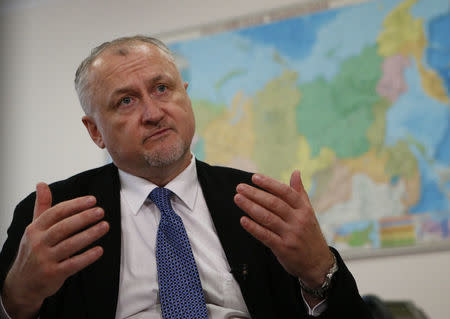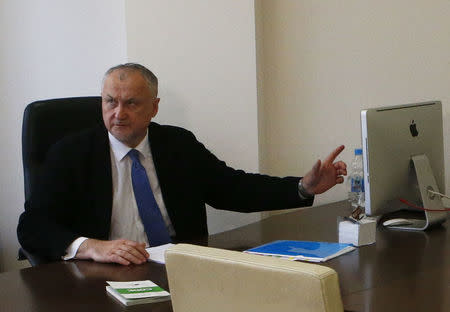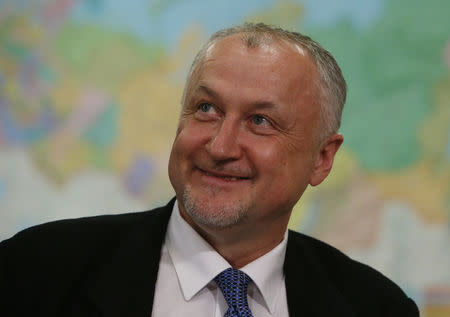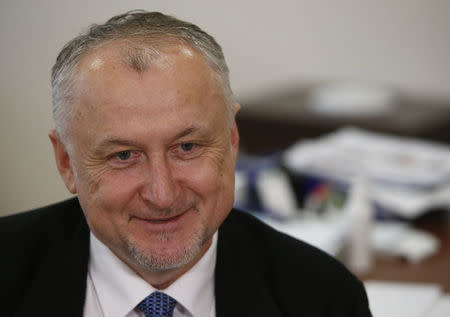Russia's new anti-doping chief looks for fresh start
By Gabrielle Tetrault-Farber MOSCOW (Reuters) - Almost two years after Russia crashed out of world athletics amid a spate of drugs scandals, former university lecturer Yuri Ganus sits in his Moscow office, plotting the rehabilitation of the national anti-doping agency. The 53-year-old, who took over as the RUSADA agency's director general just three weeks ago, told Reuters sweeping staff changes and a switch of mindset had already left the organisation almost unrecognisable. "We have changed our director, our leadership, 90 percent of our staff," Ganus said. "All inspectors in charge of taking samples are new." RUSADA had its global accreditation suspended after reports by the World Anti-Doping Agency (WADA) found evidence, still denied by Moscow, of state-sponsored doping. Next week, WADA returns to the anti-doping agency to see what steps it has made towards returning to the world arena. Ganus said there was still work to do but said his staff was ready for the review. "We want to show WADA what the situation is actually like," said Ganus, who has no apparent ties to Russia's sports bureaucracy. "We won't paint pretty pictures." CULTURE CHANGE Some of the reforms that WADA says Russia still has to make are out of Ganus's hands. The government has to give testers access to stored urine samples in a Moscow laboratory. Potentially most difficult of all, Russia's sporting authorities - including the sports ministry and the Russian Olympic Committee - have to acknowledge the findings of the 2015 WADA-commissioned reports by Canadian lawyer Richard McLaren into wide-scale doping. Ganus did not comment directly on the accusations of past wrongs. He also did not give details on how Russia would meet the demand to acknowledge wrong-doing, saying only that all reinstatement criteria were taken equally seriously. "We need to understand that the culture needs to change, not only RUSADA," he said. "That's the basis of clean sport." RUSADA is also facing more immediate concerns, most pressingly how to get sportspeople tested who hope to compete at 2018 Winter Olympics in Pyeongchang, South Korea. The doping scandal, which has also led to the suspension of Russia's athletics federation and its Paralympic Committee, has effectively barred Russians from competing in global athletics events - though some have been allowed to appear as neutrals. Russian competitors in other sports can still appear at events - including, currently, Pyeongchang - though they have to find someone else to test them for drugs. Under the current suspension, RUSADA still has to send samples abroad - a "real problem" for the agency, says Ganus. RUSADA recently contacted other national anti-doping agencies, inviting their officers to help test athletes in Russia while their Russian counterparts are trained, Ganus said. OPEN TO COOPERATION "One of the ways in which the current organisation differs from the old one is that we are open to cooperation," he said. RUSADA was eager to learn from the world's leading national anti-doping organisations (NADOs). "This is a matter of trust," he said. "Maybe they wouldn't want to work with the old organisation, but I don't see why they wouldn't work with the new one." That trust may take a while to build. Last week 17 NADO leaders called for Russia's exclusion from Pyeongchang, saying that a country's "sport leaders and organisations should not be given credentials to the Olympics when they intentionally violate the rules and rob clean athletes". But Joseph de Pencier, chief executive of the Institute of National Anti-Doping Organisations, went out of his way to welcome Ganus and his calls for cooperation. "Now that it has a new permanent Director General we want to support RUSADA to become code-compliant again and to rejoin active participation in the NADO network," de Pencier said. "It is in the best interests of all NADOs, and of the clean athletes they serve, that Russia and its athletes have a strong, independent, effective, code-compliant and internationally-connected RUSADA." (Reporting by Gabrielle Tétrault-Farber; Editing by Andrew Heavens)

 Yahoo Sport
Yahoo Sport 

















































